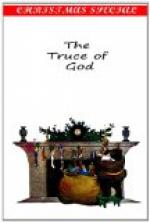But when apprised of the position of his parishioners, who must inevitably have perished from the oldest to the youngest, the old man bent his head upon his breast, and, pressing his hands to his face, wept bitterly. He soon recovered his habitual resignation, and then, turning to Gilbert, said mournfully:
“Do you see, my son, that God is beginning to punish our feud?”
Immediately after his victory, Rodolph despatched messengers to the Pope to give him the intelligence, and implore him to recognize the king in the victor.
We always approach with veneration and extreme diffidence the character of this mighty man. It is difficult, indeed, to form an adequate idea of his moral grandeur. The better you study his views, the more you are astonished at his wisdom and fore-sight; the deeper your scrutiny of his motives, the higher your respect for his sanctity. His was an age of transition. The great question was still undecided: Shall liberty or tyranny prevail—barbarism or civilization? This question depended upon the answer to another: Shall the Church of God be free or become the creature of temporal power? Already William the Conqueror and Henry of Austria were trying to fetter the spouse of Christ—already the gulf was opening that threatened spiritual Rome with destruction. Then it was that Gregory VII saved the Church as Curtius saved the city; but while the pagan has been raised to the skies, the Christian has been insulted and belied.
Never can we sufficiently contemplate the spectacle of one man contending against the world! Not a chieftain, at the head of an army, subduing kingdom after kingdom, but a priest, without a carnal weapon, resisting a continent combined at once to crush him, and finally vanquishing by his death. Uninspired by ambition, assailed by every earthly motive, God alone could have directed, and God only could have upheld him. The Emperor of Austria had sworn to depose him, the Italians promised to assist his antagonist. With scarce a footing in Germany or Italy, cooped up on a barren peak, he wrestled with the haughty conqueror of England, humbled the pride of Nicephorus Botoniates who had usurped from Michael Paripinasses the empire of the East, and deposed Guibert the guilty Bishop of Ravenna. Yet amid these cares, such as human shoulders seldom knew before or since, he forgot not the objects to which he had dedicated his life—the punishment of simony and the preservation of ecclesiastical purity. It was in the attainment of these, that he arrayed kingdoms against him and died in exile at Salerno. Harassed and chained down as he was, the councils of Anse, Clermont, Dijon, Autun, Poietiers, and Lyons were thundering against simony and incontinency.
It would be presumptuous to offer a word in defence of the conduct of such a man, had not his actions been so grievously misstated, and his aims so ungenerously misinterpreted. It were as well to point out the sun when the eye is dazzled by its brightness.




